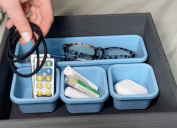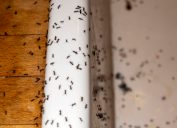13 Worst Items to Store in Your Pantry
You'll be better off finding another place in your home for these things.
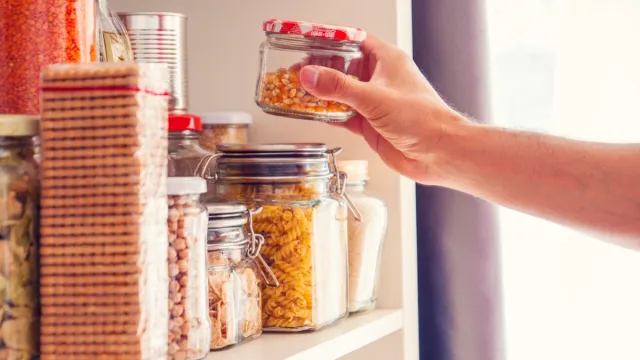
Don't deny it: You probably let products pile up in your pantry, only bothering to get rid of something when it's empty or expired. But it's not necessarily the stacks of canned goods and boxed staples you should be worried about clearing out. Instead, there may be things in your pantry that were never supposed to be there in the first place—whether that's certain foods or common household items. Talking to experts, we uncovered some of the most common storage mistakes people make in this kitchen area. Read on to discover the 13 worst items to store in your pantry.
RELATED: 8 Items You Should Never Store in Your Shed, According to Experts.
1
Nuts and seeds
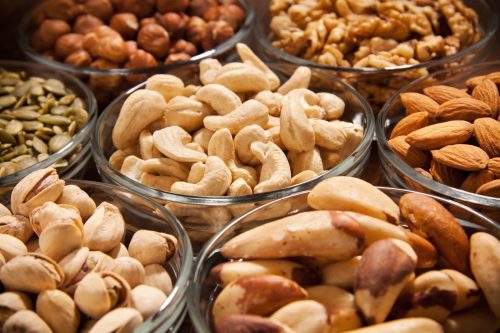
Jen Brown, an experienced chef who works as a professional food stylist for films, tells Best Life that many of the issues with improper pantry storage nowadays come down to room temperature.
"Historically, homes were much cooler than they are today, making the pantry an ideal spot to store food," she says. "However, modern heating systems have increased the average temperature of homes substantially, and the room temperature of your pantry may be too high for certain foods."
Nuts and seeds are one of the most common categories affected by this modern difference, according to Brown.
"They are prone to bacterial growth and can become rancid when stored in a warm pantry," she reveals. "To keep nuts and seeds fresh, store them in an airtight container in the fridge or freezer."
RELATED: 10 Household Items You Didn't Know Were Toxic to Dogs, Vets Say.
2
Bread
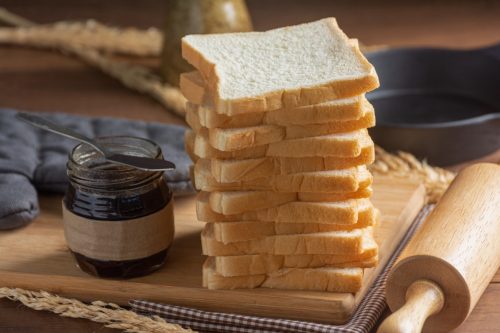
This change can affect your bread as well, according to Jesse Feder, a registered dietitian working with MyFoodAllergyTeam.
"Bread does not last that long in the pantry and can end up drying out. Additionally, in warmer pantries, bread can start to get mold growth," he shares.
Instead, Feder suggests keeping your bread out on the counter for short-term use, or putting it in the freezer if you need a long-term storage solution.
3
Peanut butter
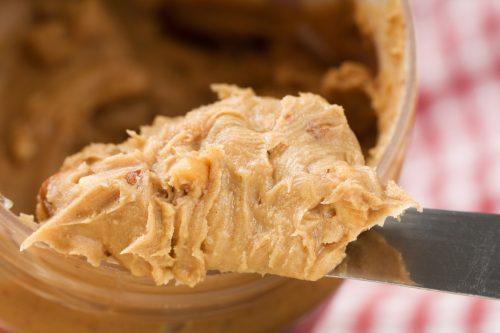
Many of us are used to keeping their peanut butter in the pantry. But Artem Kropovinsky, home expert and founder of the Arsight design studio in New York, says you should really reconsider this storage method.
According to Kropovinsky, "peanut butter can go rancid at room temperature," especially if it's natural peanut butter.
"So keep it in the fridge after opening," he advises.
RELATED: 5 Things You Should Put Away in Your Kitchen When Guests Come Over.
4
Maple syrup
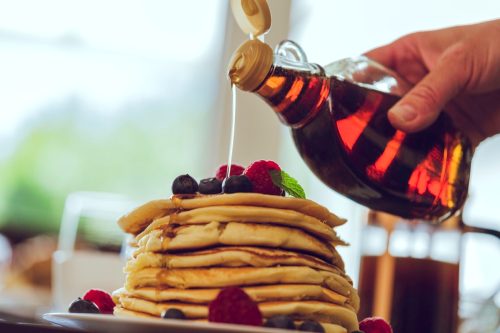
We generally assume that maple syrup is shelf stable, according to Dan Gallagher, a certified nutritionist with Aegle Nutrition.
"But it is actually not," he cautions. "It can grow mold if kept outside the refrigerator, so make sure you don't waste the maple goodness by keeping it in the pantry."
This is especially true for organic maple syrup, Gallagher says. However, he recommends playing it on the safe side no matter what type you have.
"The cheaper, heavily processed versions with a plethora of additives might be fine to keep on the shelf in the pantry," Gallagher notes. "But I would even refrigerate those after opening the bottle. No need to tempt fate with your syrup storage choices."
5
Coffee
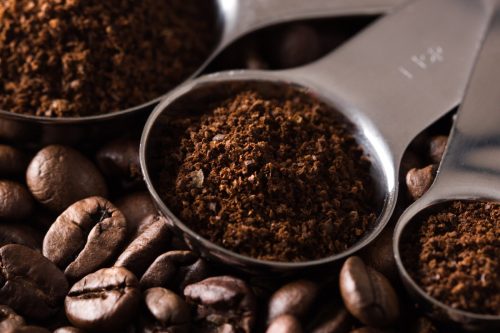
If you enjoy a quality cup of joe to kickstart your morning, it's best to keep your coffee out of your pantry as well.
"Both coffee beans and ground coffee can lose its flavor or strength when exposed to warmer air that is found in the pantry," Feder explains.
6
Wine

When you store your wine in the pantry, you can "ruin its flavor profile," according to Feder.
"Wine flavor can become altered with fluctuations in temperature of a pantry," he says. "This alcoholic beverage is best stored in a cool dark place that has consistent temperature control."
7
Onions and garlic
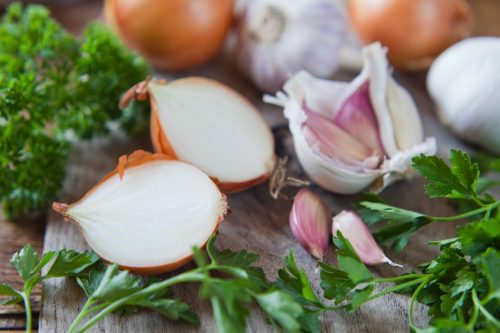
If you're getting your garlic, onions, or shallots from your pantry when you cook, you're doing it wrong, according to Jessica Randhawa, food expert and owner of The Forked Spoon. These are all allium vegetables, which Randhawa says should never be stored in this space.
"Allium family members have strong odors that can affect the flavor of other porous foods like rice, flour, and spices in the pantry," she notes. "It is best to store alliums away from direct sunlight in a well-ventilated kitchen area, such as a countertop or a shelf."
RELATED: 5 Quick Ways to Get Rid of Kitchen Smells Before Guests Come Over.
8
Flour
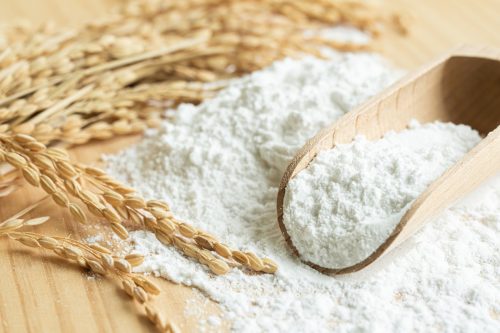
Speaking of flour, it's more than likely that yours is also sitting in the pantry right now. But as a real estate professional who has experienced many different home environments, Keith Sant advises people against keeping their flour in the pantry for an extended period of time.
"The biggest issue with storing flour in the pantry is that it can attract pests such as weevils and moths," he explains. "These insects are attracted to the moisture and nutrients in flour and can quickly contaminate the entire bag."
If you're not planning to use up all your flour quickly, Sant suggests putting it in an airtight container so you can store it in the freezer instead.
9
Dried fruit
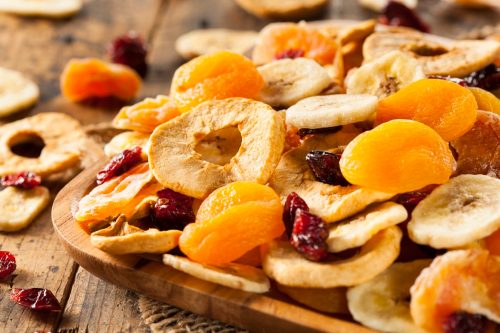
Storing dried fruit in your pantry could create a pesky pest problem as well. The high sugar content in this popular snack "can attract insects and cause them to go bad quickly," according to Sant.
"Because of this, it is best to store dried fruits in the fridge or freezer to keep them fresh and prevent them from spoiling," he says.
10
Pet food
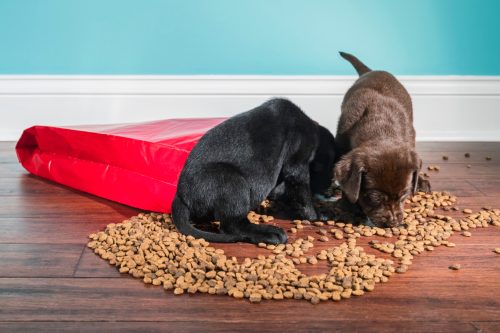
Many people hide their pet food in the pantry, too, hoping to keep its smell away from the rest of their home. Unfortunately, "that very same strong smell you're trying to contain is what attracts rodents and bugs, making your pantry a bit of a Mecca for infestations," Jennifer Burton, cleaning expert and manager for Oaks Dumpster Rental, cautions.
To avoid another potential pest problem, Burton recommends removing your pet food out of its original packaging and putting it into plastic containers.
"And keep those containers away from all other food," she adds.
RELATED: 7 Ways to Snake-Proof Your Pantry, According to Experts.
11
Pest traps
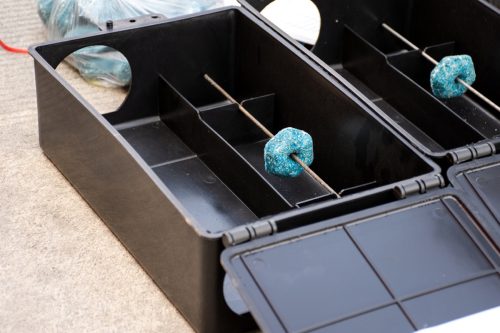
Pest problems require pest solutions. Since this area is prone to infestation, many people think it's also the perfect place to store traps, according to Steven Ip, cleaning expert and owner of Cleanzen Cleaning Services.
But whether it's mouse or cockroach bait, Ip says these items should also be stored outside the pantry.
"These baits might contaminate your food and cause health problems like poisoning," he warns. "It is best to store them in a cabinet that is away from direct sunlight and moisture,, and out of reach of children and pets."
12
Batteries

Some people use their pantry as a storage space for all their miscellaneous household items, like batteries. But this could be a hazard waiting to happen, according to Burton.
"Batteries actually need slightly cooler than room temperature storage," she says. "Think no higher than 60 degrees Fahrenheit."
What happens if they're not stored under that temperature?
"Anything hotter than that actually increases the risk of battery corrosion, which you absolutely don't want in your home, much less in your pantry near edible items," Burton says.
13
Lighters
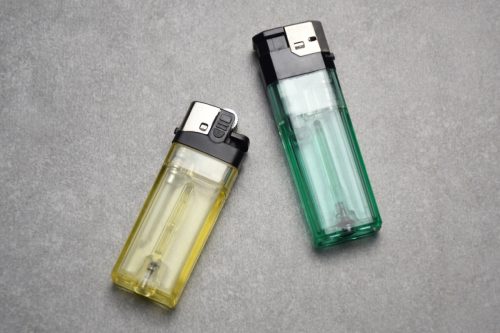
Lighters also pose some clear dangers in the pantry.
"Lighters should never be kept out in the open in a regular pantry, especially near flammable items like cardboard or paper-wrapped pantry items," Burton cautions.


